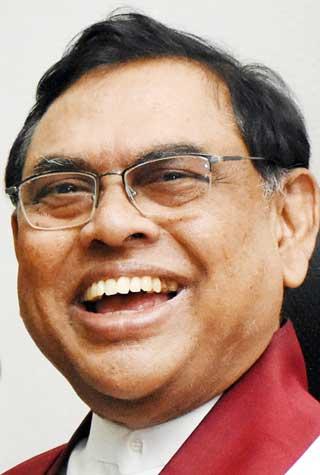16 Mar 2022 - {{hitsCtrl.values.hits}}
The Cabinet of Ministers this week granted approval for Finance Minister Basil Rajapaksa to initiate talks with the International Monetary Fund (IMF), though the country’s Central Bank still disputes the need for an IMF bailout for Sri Lanka to come out of the worst economic crisis in years.
 “As a policy, the Cabinet approved the Finance Minister to initiate discussions with the IMF and also to obtain technical assistance from them,”Co-Cabinet Spokesperson and Minister of Plantation Ramesh Pathirana told the weekly Cabinet media briefing held yesterday.
“As a policy, the Cabinet approved the Finance Minister to initiate discussions with the IMF and also to obtain technical assistance from them,”Co-Cabinet Spokesperson and Minister of Plantation Ramesh Pathirana told the weekly Cabinet media briefing held yesterday.
Changyong Rhee, Director of the Asia and Pacific Department at IMF who met Finance Minister Basil Rajapaksa on Monday was scheduled to meet President Gotabaya Rajapaksa yesterday to brief the President on the Fund’s take on the current economic crisis in Sri Lanka.
When asked whether the IMF assistance would be limited to technical assistance or the government would opt for a broad programme embedded with a debt structuring programme, Pathirana responded that it would largely depend on the conditions put forward by the IMF.
“We have to take it from what sort of conditions they put. We have to look at it from the country’s side as well. From there we will take it forward. It’s matter of time, whether it will be restricted to technical advice or not. We have to discuss and see on a futuristic basis,” he elaborated.
Finance Minister Basil Rajapaksa is scheduled to attend the IMF-World Bank spring meetings in Washington DC in mid-April, where it is largely expected to strike a deal with the multilateral lender for a programme.
However, Central Bank Governor Ajith Nivard Cabraal early this week rejected claims that the country is reaching out to the IMF for a rescue package and a Fund-led debt restructuring programme.
Pathirana noted that the country is attempting to restructure its external debt amid the current foreign currency shortage, which has led to shortages of imported essential goods including fuel, cooking gas and medicines.
He acknowledged that a debt restructuring exercise is not going to be an easy task given that the country’s wide range of creditors from bondholders to bilateral creditors need to reach a consensus.
A number of economists and experts have pointed out the lead role the IMF could play in such a debt restructuring exercise as a mediator, in particular when it comes to restructuring international sovereign bonds (ISBs), which involves thousands of bondholders.
Meanwhile, Pathirana pointed out that the government has already taken several key policy decisions to ease the foreign currency shortage with the latest move being allowing the currency to free-float.
IMF under its annual Article IV consultations recommended the government to focus on fiscal consolidation based on high-quality revenue measures while advocating for a tighter monetary policy stance to contain the rising inflationary pressures in order to come out of the current crisis.
It also prescribed the government to float the rupee, price utilities at market prices and to reform unproductive State enterprises to reduce debt burden.
Although, the government earlier hoped to come out of the current crisis with a quick recovery of the tourism sector, Pathirana noted that Russia-Ukraine war has dampened the prospects of a quick recovery of the tourism sector.
The conflict also has led record-high oil and commodity prices increasing the country’s import bill and worsening the balance of payment issues.
15 Nov 2024 2 hours ago
15 Nov 2024 3 hours ago
15 Nov 2024 4 hours ago
15 Nov 2024 4 hours ago
15 Nov 2024 5 hours ago